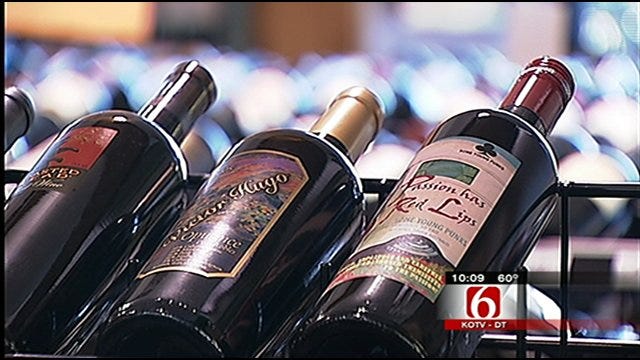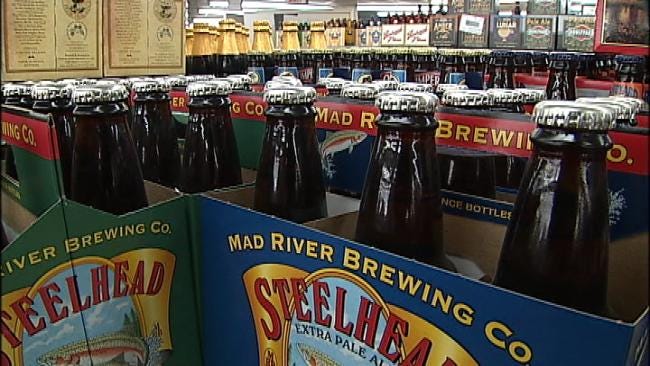Changing Oklahoma's Liquor Laws: No Easy Task (Force)
Oklahoma lawmakers are expected to approve legislation this session that could, potentially, lead to the most significant changes in the state's liquor laws since liquor-by-the-drink was approved in the mid-1980s.Tuesday, May 3rd 2011, 9:06 pm
Alex Cameron, Oklahoma Impact Team
OKLAHOMA CITY -- Oklahoma lawmakers are expected to approve legislation this session that could, potentially, lead to the most significant changes in the state's liquor laws since liquor-by-the-drink was approved in the mid-1980s.
SB 658 would create, for now, a simple legislative task force, but, ultimately, could create a path to expanded liquor sales -- specifically, the sale of wine and 'strong' beer in grocery stores and convenience stores.
Under current law, grocery stores may only sell 3.2 beer (3.2 percent alcohol by weight) -- so-called 'non-intoxicating,' or weak, beer. In order to purchase stronger beer, or wine, in Oklahoma, consumers must make a separate stop at a liquor store. There are many who believe the law is antiquated and should be changed so that shoppers need not make an extra stop.
"I think it's a wonderful idea," said shopper Pat Froehle, as she recently stood alongside the 3.2 beer cooler at Crest Food, in Edmond. "When I go to Texas -- and I was just in Texas -- I buy a whole bunch of it and bring it back."
In Texas, there's no such thing as 3.2 beer, just single-strength beers that are available in the grocery store, right next to the wine. The same is true in Arkansas, Missouri, and New Mexico. Colorado permits a limited number of grocers to sell wine and strong beer, and the Kansas Legislature is considering similar changes to their laws.
Polling on the issue in Oklahoma is inconclusive. One statewide survey showed a slim majority of Oklahomans would be in favor of allowing grocery stores to sell wine. But another statewide poll showed, when likely voters were asked about the possibility of grocers offering both wine and strong beer, 3 out of 5 were opposed. A nearly identical poll, done in more urban Oklahoma County, flipped that result, showing almost 60 percent in favor.
The Greater Oklahoma City Chamber of Commerce, which commissioned the latter study, has made changing the law one of its legislative priorities.
"We think it's time that Oklahoma look at moving into the next century with regard to its laws on wine and single-strength beer," said Mark VanLandingham, the Chamber's chief lobbyist.
Sen. Clark Jolley, R-Edmond, did introduce such legislation at the beginning of the 2011 legislative session. The original version of SB 658 called for the wine and beer proposal to go to a vote of the people, in order to make the necessary changes to the state constitution.
But Sen. Dan Newberry, R-Tulsa, Chairman of the Senate's Business and Commerce Committee, to which the bill was assigned, refused to hear it.
"It's much more complicated than just--'Hey, we'll sell wine in grocery stores,'" Sen. Newberry explained, after the fact. "It's just not quite as simple as that."
Seeing the writing on the wall, Jolley pushed for a compromise, and Newberry agreed -- rewrite the bill so that it would set up a task force to study the issue.
"I just really think this is about trying to make sure we aim, and then we fire," said Newberry. "Let's make sure we understand what we're doing before we do it."
Liquor industry leaders couldn't agree more.
"We're not selling T-shirts," said Brad Naifeh. "I mean, we're selling an alcoholic beverage."
Naifeh is a third generation partner at Central Liquor Company, one of eight class A liquor wholesalers in the state, and certainly one of the largest. He says the system isn't broken, and those who want alcohol sales to be more convenient are just asking for more underage drinking, and more DUI's.
"You've got a saturation of liquor stores here, more so than in most states," Naifeh stated, "and the availability of alcohol is pretty darned good. Now, do you want to open that up to more availability? I don't think so."
Alcohol is, in fact, big business in Oklahoma. Last year, Oklahomans spent an estimated $360 million on alcoholic beverages at more than 550 liquor stores.
J.P. Richard owns one of them, Cache Road Liquor, in Lawton.
"Can we become a little more consumer friendly?" Richard asks, rhetorically. "Yes, and that's what I'm kind of hoping will happen in this study group."
Richard also serves as President of the Retail Liquor Association of Oklahoma. He says it would be criminal to allow grocers to sell wine and strong beer, because it would put forty percent of his fellow store owners out of business.
"They're not gonna create anything, but unemployment and a lot of grief within the industry as it is," Richard insisted. "It's just a cash flow grab for the grocery stores."
But critics of the liquor industry say they're the ones grabbing the cash -- that they have, effectively, set up a monopoly within the state and will do all that they can -- including overlook consumers' wishes -- to maintain the present status quo.
Brian Howe, director of Oklahomans for Modern Laws, admits some liquor stores would go out of business, but, he says, in the long run, this would be good for consumers, as well as, for retailers.
"It's gonna make 'em more competitive," Howe said, "it's gonna create a better environment for the consumer, and that's the basic principles of capitalism."
Howe adds that giving people more choice and greater convenience is a quality of life issue, and believes anything lawmakers can do to improve quality of life in the state is worth their while. For that reason, he says, he supports the task force and the promise it holds.
The joint legislative task force will be comprised of 21 people. Six of the spots will be held by lawmakers, with the remaining 15 appointed to various stakeholders. Of those, only a handful -- the chamber of commerce, a citizens group, and local wine-growers -- would appear to be strong proponents of change.
Opponents of change -- or at least those wary of it -- would seem to have the upper hand. Wholesalers, retailers, the ABLE Commission, and Department of Mental Health, to name a few, would prefer that the state not suddenly have an additional 2-thousand alcoholic beverage outlets. What's more, both the Grocers Association and Convenience Store Association, which have supported this change in other states, are staying neutral in Oklahoma.
Clearly, the task force has the potential to come back with a recommendation for legislation that would allow citizens to vote on a series of proposed constitutional changes that would make shopping more convenient for Oklahomans, while ensuring that commerce is not tilted in favor of a specific set of businesses.
"Our goal is not to hurt any single individual or any single industry," said Oklahomans for Modern Laws' Brian Howe. "We want to try to negotiate and do what the Oklahoma consumers want."
It would seem, however, there is greater potential for the task force to change nothing at all.
"I think they'll end up coming out saying 'You know what? The laws are fine the way they are and let's leave 'em alone,'" Naifeh said.
Asked if he could ever see himself saying it could be a good idea to allow grocery stores to sell wine and strong beer, Liquor Association President J.P. Richard paused for a moment, before saying, "I'm not sure that we're gonna go that far."
More Like This
May 3rd, 2011
September 29th, 2024
September 17th, 2024
Top Headlines
November 22nd, 2024
November 22nd, 2024
November 22nd, 2024
November 22nd, 2024












